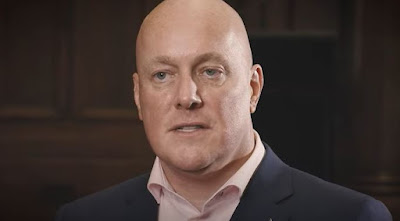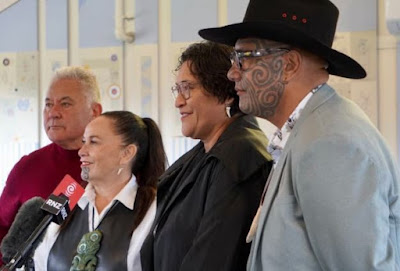 |
| Slow Learner: Effective leaders develop a political “muscle memory” of their own. The National Party should get one. |
SPEAKING IN PUBLIC tops most people’s list of fearful situations. There are some careers, however, for which public fluency is a non-negotiable pre-requisite. There’s little point in pursuing an acting career, for example, if you’re frightened of audiences. The same applies to anyone intending to pursue a career in politics. There’s a reason why the study of rhetoric was part-and-parcel of a young nobleman’s education for a thousand years. Those who wish to rule their fellow human-beings non-violently, must be able to speak to them persuasively.
It is not, however, an easy skill to master. One of the more important reasons for maintaining political parties is to allow the idealistic and the ambitious to perfect the art of public speaking in an environment that is not, in the strictest sense, public. Party meetings and conferences are realistically political, but what is said there is unlikely to inflict serious damage upon party fortunes. Seasoned observers know that most conference delegates are amateurs, and that their utterances are not to be taken all that seriously.
Which is not to say that a shrewd political journalist will not be rewarded for keeping a watchful eye on low-level party gatherings such as regional conferences. In among a great deal of rhetorical dross, attentive journalists do occasionally encounter a truly outstanding public speaker. One whose understanding of the subject under discussion, evocative language, and all-round command of both themselves and their audience positively screams: “One to watch!”
As the years pass, and one party conference follows another, these outstanding performers may be observed rising steadily through the ranks. Some, of course, will fall by the wayside – victims of their own inflated assessment of their political importance. But, those whose political instincts are sound – i.e. those who avoid rocking the boat too vigorously – are generally rewarded with their party’s nomination. Not for a winnable seat, at least, not first off, but in order to further hone their political skills – under live fire.
One of the most important skills a candidate can master in these preliminary electoral bouts is that of resisting the temptation of telling voters what they want to hear. At just about every election meeting there will be an opportunity for questions from the floor. By then, experienced candidates will have already “read the room”. They know their job is not to capitulate to the audience’s opinions, but to shape them. Pandering to people’s prejudices is the essence of demagoguery – not successful party politics.
By the time these “ones to watch” are selected as candidates for winnable, or, better still, safe parliamentary seats, their rhetorical ability, tactical instincts, and strategic skills are plainly evident. But, winning a seat is only the beginning. A whole new apprenticeship looms, during which they must master the art of being a Member of Parliament.
At this point, alert readers will already be shaking their heads. This steady progression towards a parliamentary career may well have been the way politicians played the game forty years ago, when New Zealand electoral politics was dominated by two mass parties operating under the first-past-the-post electoral system. But, it is very far from being the way the politically ambitious become Members of Parliament in 2023.
In a mass party, the competition for the role of party representative in Parliament is fierce, and “winning one’s spurs” in the cut-and-thrust of intra-party politics is both admired and expected. But, neither National nor Labour are any longer mass parties.
The era of MMP is also the era of the so-called “cadre” party. In the mass parties of the past, advancement depended on how successfully party members had mastered the art of winning over their party comrades and pinning-down their votes – the politics of democracy. In parties organised by and for societal elites, the impetus for representation comes not from below, but above. To advance in a cadre party (of which Labour and National are both now examples) one must master the circuitry of power and influence – the politics of the courtier.
Unfortunately, if selection for a winnable seat, or a high placement on a Party List, becomes a matter of not what you know, but who you know, then the winnowing process which served National and Labour so well in the past, and which prepared prospective parliamentarians so thoroughly for the career of people’s representative, is undermined. Parliamentary candidates appear – as if from nowhere – chosen by the high and mighty, known only to party insiders, and, all-too-often, pitifully lacking in even the basic skills of winning voter support.
This is the weakness that saddles the New Zealand voter with Members of Parliament who are not only lacking in rhetorical ability, tactical instinct, and strategic skill, but are also alarmingly ignorant of the experiences, aspirations and values of the ordinary Kiwi voter.
The men and women who transformed National and Labour from mass parties into cadre parties may have rid themselves of bottom-up, democratic, intra-party politics, with all its embarrassments and irritations, but in the process of making their parties lean, mean, elite-driven machines, they forgot that the game they are playing, electoral politics, is, by definition, bottom-up and democratic.
National and Labour are selecting All Blacks who have never played Rugby. How else to explain Sam Uffindell and Gaurav Sharma?
Or, for that matter, Christopher Luxon?
Experience in the management of large corporations is one thing, experience in the rough-and-tumble of democratic politics, quite another. National has not only saddled itself with a politician with zero experience of cutting and thrusting his way up the spiral staircases of the National Party, but it was also willing to anoint as Leader a man with barely 13 months’ experience as a Member of Parliament.
Put a person of Luxon’s political inexperience in front of a hall-full of conservative voters and he is almost guaranteed to make the beginner’s error of telling them what they want to hear. If that involves abandoning Medium Density Residential Standards, the bi-partisan plan National agreed with Labour allowing three-storey dwellings to be built on all residential land in the main cities, then so be it. What was he supposed to say to these angry NIMBY voters? No?
Athletes and musicians talk about developing “muscle memory” – the practically unconscious mastery of their occupations that only comes from thousands of hours of practice, and years of experience. Effective leaders develop a political muscle-memory of their own. In answering tricky questions from the media. In delivering a stump speech as if it is the first time the words have passed their lips. Of knowing exactly how to lure their opponents into a policy trap – and then spring it. Of instinctively veering away from the “creepiness” of AI-generated images.
That National can no longer lay its hands on such a leader, tells us something about the state of New Zealand politics four months out from the 2023 General Election.
It’s not encouraging.
This essay was originally posted on the Interest.co.nz website on Monday, 29 May 2023.













